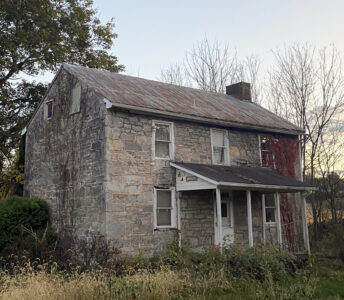Local officials, organizations react to state budget passage
LOCK HAVEN — After a four month budget impasse that left many local officials uncertain of future funding, the House and Senate both passed the Commonwealth of Pennsylvania’s $50.1 billion on Wednesday, with Gov. Josh Shapiro providing his signature later that afternoon.
The passage marks an end to the halt of state dollars to schools, counties and nonprofits who provide critical services.
For local officials, particularly those actively working on the 2026 budget, it offers a more clear path forward in planning.
The Clinton County Commissioners on Thursday received its first presentation regarding the county’s preliminary 2026 budget.
Commissioner Angela Harding noted the passage of the budget is a relief “to not only our county but the counties that surround us.”
She noted the federal government’s moves to reopen as well, stating both levels returning to operation is integral to a lot of nonprofits, agencies and more that need both to be operating and working.
“I just want to express my thankfulness that they are finally back to work and doing the jobs they were elected to do,” Harding said.
Commissioner Jeff Snyder said he reached out to State Senator Cris Dush to find out when dollars would be flowing, noting the burden school districts, housing and food programs among others have faced in the last four months.
Snyder said Dush was unable to give him an answer but was reaching out to the Treasurer’s office to learn more.
“You’d think from history, with many years they’re unable to pass a state budget in a timely manner, that they’d get their act together and do what they’re getting paid to do,” Snyder said of the legislators. “To that, they shouldn’t get paid, when anyone else doesn’t get paid when they don’t do (their job).”
The months-long impasse also saw an effect on services that provide assistance to food insecure individuals.
The Central PA Food Bank offered its own thoughts regarding the passage of the budget, and the ability for this funding to flow to it and other similar organizations.
“The Central Pennsylvania Food Bank is grateful that the General Assembly has passed and Governor Shapiro has signed the 2026 state budget into law. With renewed funding, both the State Food Purchase Program (SFPP) and the Pennsylvania Agricultural Surplus System (PASS) will once again provide vital support to Pennsylvanians facing food insecurity while strengthening local farm communities,” a release from the food bank said.
The budget included an increase of $3 million to the SFPP program, which the food bank called “a cornerstone of Pennsylvania’s anti-hunger efforts.”
“SFPP keeps food pantry shelves stocked across the Commonwealth, providing essential resources that enable small community organizations to operate safely, efficiently and effectively while serving their neighbors in need,” the release said.
The PASS received a $1 million increase. According to the food bank this, “strengthens the connection between agriculture and hunger relief.”
“This program helps deliver fresh fruits, vegetables and nutrient-rich proteins to families across the state,” the release said.
Officials at the food bank thanked the General Assembly and Shapiro for passing the budget and continued support in fighting food insecurity within the Commonwealth.
“Food insecurity has been on the rise now for years — with an increase of 44 percent in just the past two years alone, making additional investments in the charitable food system even more critical,” the release said. “With one in eight Central Pennsylvanians, including one in six children, facing food insecurity, sustained and reliable funding is essential to meet the growing needs of our communities. With rising food prices and diminished federal support, we anticipate the need will continue to grow.”
On a state level, Representative Stephanie Borowicz (R-Clinton) said she couldn’t support the long-delayed General Appropriations bill “because it spends more than it should and increases the potential for a tax in a couple years.”
However, she noted she was happy to see an end to the Regional Greenhouse Gas Initiative.
“I am happy the budget agreement repeals, through statute, the regulations that forced Pennsylvania into the Regional Greenhouse Gas Initiative. This action not only restores legislative oversight and authority, it also protects and facilitates creating family-sustaining energy jobs, avoids what would have been a 30 percent increase in energy bills by 2030 and revitalizes our Commonwealth’s energy industry that will help increase the supply of energy and ensure a reliable energy grid, which will help to reduce energy costs,” Borowicz said.
Representative Paul Takac (D-Centre) praised the passage of the budget, which included what he called a responsible plan to advance priorities without raising taxes or tapping into the Commonwealth’s Rainy Day Fund.
“This is responsible governance — fiscal discipline paired with compassion,” Takac said. “With $11 billion in reserves and no tax increase, this budget meets our current needs while protecting our future.”
Takac highlighted how the budget addresses affordability and strengthens programs that matter to families across the district. He noted the plan increases Basic Education funding by more than $100 million, boosts Special Education by $40 million, and directs nearly $600 million to begin correcting long-standing adequacy gaps in school funding. The budget reforms charter payments to align with actual instructional costs, saving local taxpayers roughly $178 million statewide, and adds another $100 million for school safety and mental health services. It also strengthens Early Childhood Education through investments in high quality, affordable pre-K, supports measures to make it easier and more affordable for teachers to enter classrooms and invests in college affordability so talented young people can learn and build careers here in Pennsylvania.
For working families, he noted it includes a new Working Pennsylvanians Tax Credit equal to 10 percent of the federal Earned Income Tax Credit. This is expected to return roughly $400 to $1,000 or more to qualifying households, he said.
Additionally, the plan makes significant investments in health and human services, including $750 million for Medical Assistance managed care to stabilize services and providers and increased funding for direct care workers, while adding an additional $150 million for services for individuals with intellectual disabilities, and $40 million to expand food security and support family farms facing federal shortfalls.
Takac emphasized the budget’s commitment to public safety, the environment and energy reliability. The package increases funding for both the departments of Environmental Protection and Conservation and Natural Resources, invests in targeted environmental projects, advances Solar for Schools and grid improvements to create jobs and lower costs and adds resources for the Pennsylvania State Police while continuing critical support for rape crisis centers and domestic violence programs.
To spur economic growth, the budget dedicates more than $100 million to job creation, innovation and entrepreneurship and includes steps to speed permit approvals so that more businesses can expand without excessive state delays.
“No budget is perfect, but this proposal advances many of the key priorities that my colleagues and I have steadfastly fought for,” Takac said. “It is a pragmatic, bipartisan plan that creates jobs, invests in our children, protects seniors, eases affordability pressures and preserves fiscal stability we can build on in the years ahead.”
State Senator Cris Dush (R-25) noted there were many wins within the budget passage, including the integration of funds that were “hidden” during previous budget impasses in 2015 and 2017 under Tom Wolf’s administration.
We’re using special funds and money that has just been building in these accounts, as well as money that hadn’t been spent in prior years that has been sitting in different accounts,” Dush told The Express. “We’ve got $3 billion we pulled out of the seat cushion. That’s kept us from having to dip into the Rainy Day Fund.”
On education, Dush said a new formula was able to be constructed to better assess charter school funding that has burdened public schools for some time.
He explained there are three tiers for special education within charter schools, with the third tier costing about $8,000 or more per student per year. He noted a large number of students were being placed into that top tier.
“We came up with a formula based on the statewide average of kids in public schools that actually have special needs and looked at the percentage of those that were in the tier one, tier two and tier three and then came up with a formula that says ‘this is what you’re getting,'” he said. “It’s a significant help to these school districts that are getting hit with these kids being put in tier 3.”
Also within the budget, Dush said, was the reallocation of funding to help fill a gap in monies that assist senior citizens.
“We’ve got all of these mini casinos popping up and we’re trying to address that and get it taxed properly. People who are playing scratch offs (whose funds benefit seniors in the Commonwealth) have significantly declined because they’re spending their money in mini casinos,” Dush said. “We’ve shifted some of the money we pulled out of other funds into (the lottery fund) to help balance it.”
An outspoken advocate regarding the reduction of human trafficking in the Commonwealth, Dush said he was happy the funding received a bump of $750,000, making it now $1.75 million in the recently passed budget.
“It’s a horrendous problem in the state and around the country. I’m really proud we were able to get that money in there. The AG office has got some dedicated people to get into that fight,” he said.
Dush acknowledged he voted against the passage of the budget, but noted significant headway was made in getting onto the course he feels will benefit constituents and Commonwealth residents.
“I voted against the actual budget because of the overspend. I’ve always told everybody I’m not going to vote to put ourselves over a barrel for tax increases. This will do it, even with what we’ve found. Unless the economy takes off here, we’re still in a structural deficit,” he explained.
However, he noted moves needed to be made to restore funding for human service agencies.
“I hate having them held as hostages to come up with these higher numbers,” he said.
The final item Dush touched on was the removal of the Regional Greenhouse Gas Initiative.
“We’ve kept that from going into the Supreme Court. That is a tax increase, it gives control over Pennsylvania energy to 13 other states,” he said.
Dush said, if the state remained with RGGI and the Supreme Court allowed it to move forward, it would have caused “significant increases in our heat and electric bills.”
“We’re actually at a point where there are more people on a fixed income in Pa. than we’ve ever had. They can’t afford those kinds of rate hikes,” he said.
He added, with permit reform, he’s hoping to see movement in the Renovo area regarding a natural gas plant. Plans for a plant were in limbo for years prior to stakeholders pulling out of the project.


